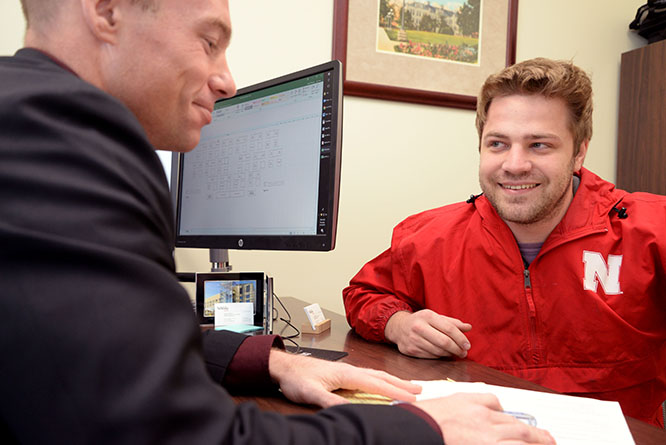Nebraska accounting professors utilize the support of MPA teaching assistants (TAs) to provide cutting-edge learning experiences. Tony Zoucha, ’18, offers TA support through current case studies to help students understand how coursework applies to their future careers.
“I worked on case studies as an undergraduate and still do in my master’s classes,” said Zoucha. “The case studies help them learn industry standards by showing real-world problems. Students are pitched a problem and then get into details of figuring out how accounting standards are applied. We dig in and see first-hand what accountants face.”
Dr. Aaron Crabtree asked Zoucha to become a TA based on his abilities in the undergraduate program. He believes Zoucha and the
donors, Stacy and Hubert Ban, who fund his TA position help make it possible for the school to stay on the leading edge of learning.
 Tony Zoucha consults with Dr. Jimmy Downes about a research project.
Tony Zoucha consults with Dr. Jimmy Downes about a research project.
“When you get into the real world, you face complex problems with many moving parts and no ‘right’ answer. The best way to help students is using cases that bring part of the profession into the course. They get early and repeated exposure to those situations. Without TA assistance grading those case studies, it would not be practical for us to continue to focus on cases and data analysis in our courses,” said Crabtree.
Dr. Jimmy Downes, assistant professor of accountancy, works with Zoucha and other TAs. He sees the symbiotic relationship as ideal for helping MPA students better understand the material they learned as undergraduates.
“The TAs relieve my time in terms of grading, which is great, but it’s also beneficial in helping TAs develop critical thinking skills when grading case studies. They get a new understanding of the material when they’re teaching it to someone else. They think they understand it as an undergraduate but it’s a whole other world when they relate it to other students,” said Downes.
Without the funding supporting the TA positions, Downs believes his role as a teacher and researcher would be negatively impacted.
“To the extent we can develop new cases each semester, it’s much more beneficial to students to receive fresh, relevant material that drives their critical thinking skills. Cases take time to develop. Even though I’m still facilitating the case study discussion in class, the fact I don’t have to do all the grading means I can put time toward valuable things such as creating new cases,” he said.
Zoucha, who plans to work at Deloitte in an auditing job after he completes his master’s, took on the TA challenge even though he already worked part-time at Nelnet. He evolved to become a primary research assistant of Downes.
“Dr. Downes gives me 10-K reports (summary of a company’s financial performance), and I grab the data to complete an Excel worksheet for him to analyze later. I get research experience through the lower end work and then he can spend the time developing case studies. Seeing and understanding the research side has been enlightening and valuable for my future,” Zoucha explained.